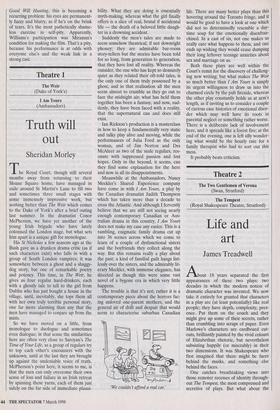Theatre 1
The Weir (Duke of York's) I Am Yours (Ambassadors)
Truth will out
Sheridan Morley
The Royal Court, though still several months away from returning to their Sloane Square home, have managed in exile around St Martin's Lane to fill two and sometimes three small stages with some immensely impressive work, but nothing better than The Weir which comes to the Duke of York's after a brief outing last summer. In the dramatist Conor McPherson, we have yet another of the young Irish brigade who have lately colonised the London stage, but what sets him apart is a unique gift for monologue.
His St Nicholas a few seasons ago at the Bush gave us a drunken drama critic (as if such characters exist) who falls in with a group of South London vampires; it was somewhere between a ghost and a shaggy- dog story, but one of remarkable poetry and potency. This time, in The Weir, he gives us four regular hard-drinkers, each with a ghostly tale to tell to the girl from Dublin who has just bought a house in the village, until, inevitably, she tops them all with her own truly terrible personal story, one far more alarming than any that the men have managed to conjure up from the mists.
So we have moved on a little, from monologue to duologue and sometimes even dialogue; in that sense the similarities here are often very close to Saroyan's The Time of Your Life, as a group of regulars try to top each other's encounters with the unknown, until at the last they are brought up against the undeniable voice of truth. McPherson's point here, it seems to me, is that the men can only overcome their own sense of loss and failure in an Irish retreat by spinning these yarns, each of them just safely on the far side of immediate plausi- bility. What they are doing is essentially myth-making, whereas what the girl finally offers is a slice of real, brutal if accidental life — the death of a beloved little daugh- ter in a drowning accident.
Suddenly the men's tales are made to seem somehow theatrical, if not downright phoney; they are admirable bar-room story-tellers but the stories have been told for so long, from generation to generation, that they have lost all reality. Whereas the outsider, the one who has kept so demurely quiet as they related their oft-told tales, is the only one of them truly possessed by a ghost, and in that realisation all the men seem almost to crumble as they go out to face the midnight air; what has held them together has been a fantasy, and now, sud- denly, they have been faced with a reality, that the supernatural can and does still exist.
Ian Rickson's production is a masterclass in how to keep a fundamentally very static and talky play alive and moving, while the performances of Julia Ford as the only woman, and of Jim Norton and Des McAleer as two of the male regulars, res- onate with suppressed passion and lost hopes. Only in the beyond, it seems, can they find some explanation for the here and now in all its disappointments.
Meanwhile at the Ambassadors, Nancy Meckler's Shared Experience company have come in with I Am Yours, a play by the Canadian dramatist Judith Thompson which has taken more than a decade to cross the Atlantic. And although I fervently believe that we are still not seeing nearly enough contemporary Canadian or Aus- tralian drama in this country, I Am Yours does not make my case any easier. This is a rambling, enigmatic family drama cut up into 36 scenes across which we come to learn of a couple of dysfunctional sisters and the boyfriends they collect along the way. But this remains really a play about the past; a kind of familial guilt hangs list- lessly over the sisters, and the admirably lit- erary Meckler, with immense elegance, has directed as though this were some vast novel of a bygone era in which very little happens.
The trouble is that it's not; rather it is a contemporary piece about the horrors fac- ing unloved one-parent mothers, and the general air of drift and despair that would seem to characterise suburban Canadian We couldn't afford a real car.' life. There are many better plays than this hovering around the Toronto fringe, and it would be good to have a look at one which did not so determinedly resemble a day- time soap for the emotionally disenfran- chised. In a cast of six, not one makes us really care what happens to them, and one ends up wishing they would cease dumping their long leftover teenage anxieties about sex and marriage on us.
Both these plays are well within the Court's remit for the discovery of challeng- ing new writing; but what makes The Weir so much better than I Am Yours is simply its urgent willingness to draw us into the charmed circle by the pub fireside, whereas the other play constantly holds us at arm's length, as if inviting us to consider a couple of curious case histories of emotional disor- der which may well have its roots in parental neglect or something rather worse. There is a deliberate lack of involvement here, and it spreads like a forest fire; at the end of the evening, one is left idly wonder- ing what would be the hourly rate for a family therapist who had to sort out this mess.
It probably beats criticism.


























































 Previous page
Previous page